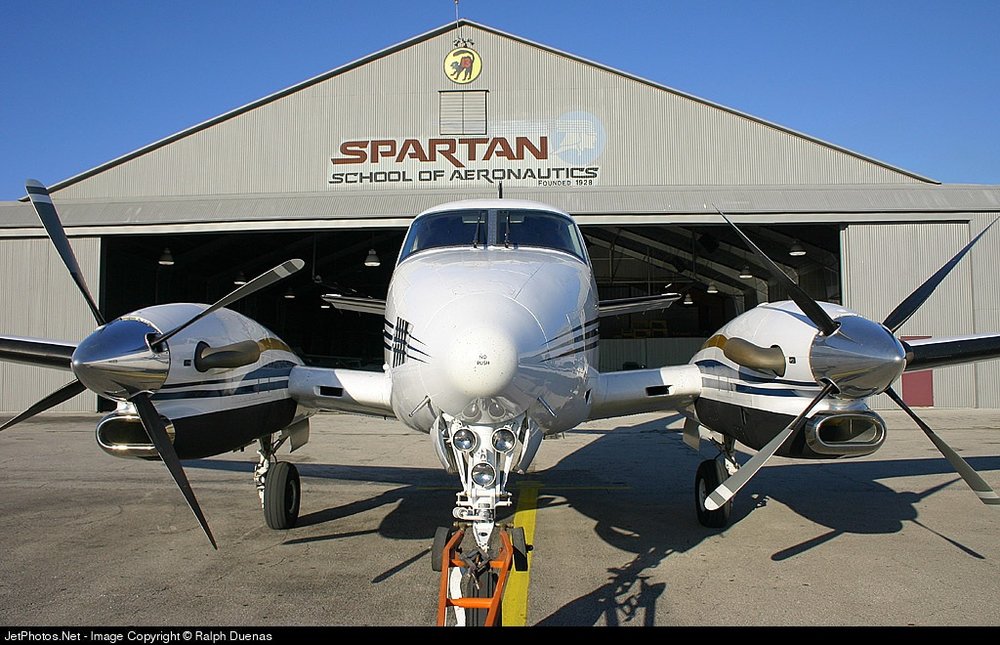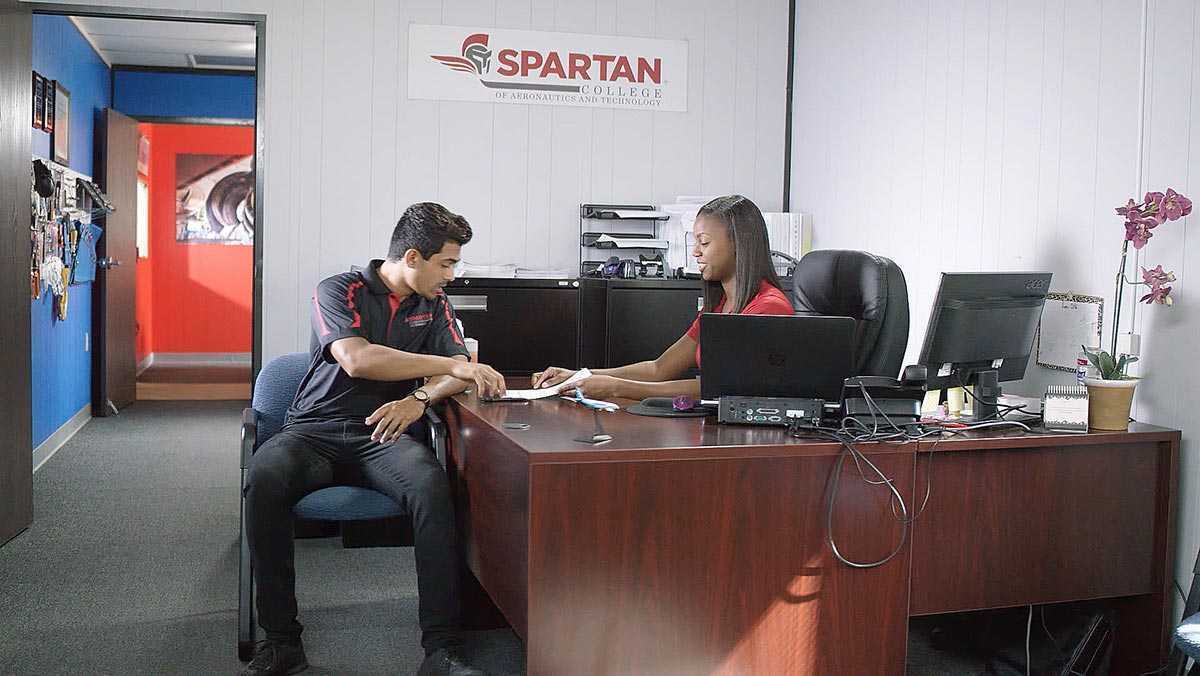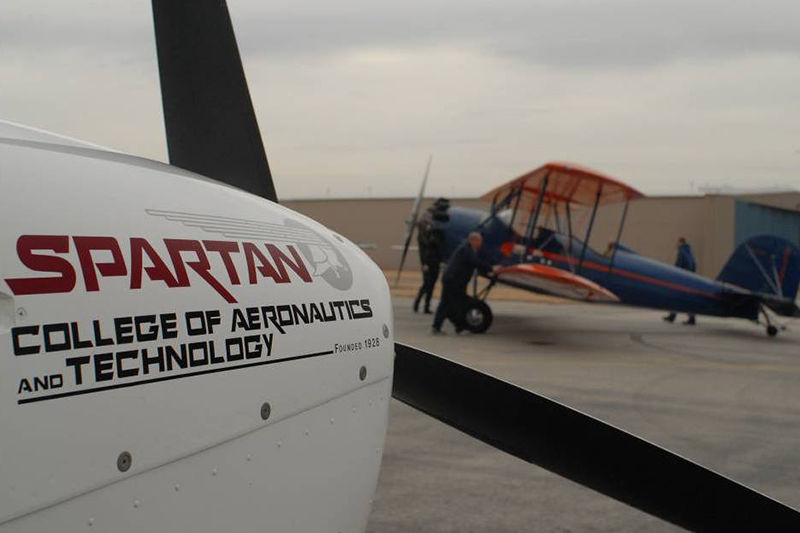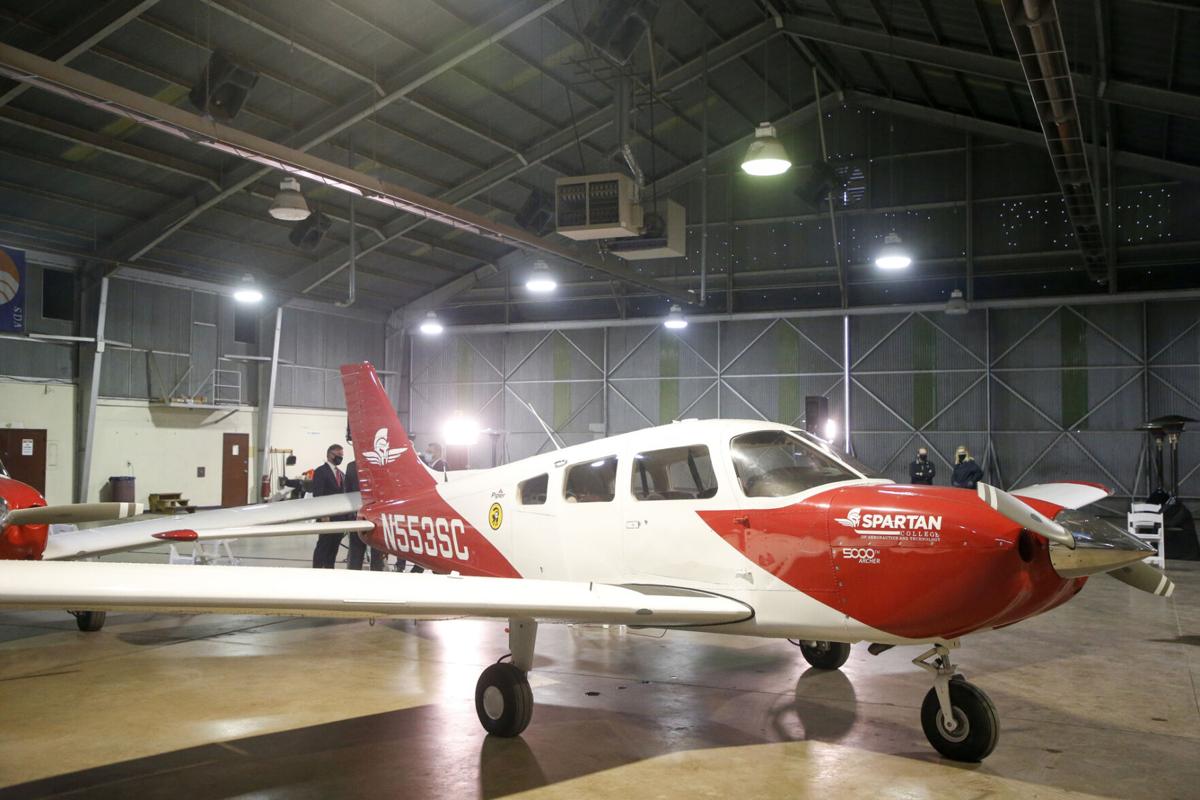Bob Martin: Welcome to this edition of Imagine America Radio. On this episode, we’re going to be discussing aviation careers—specifically careers as a pilot. Joining us today is Jeremy Cooper. Jeremy is the regional vice president of admissions at Spartan College of Aeronautics and Technology in Denver, Colorado. Today we want to discuss pilot careers. As a leading provider of education in aviation, we couldn’t think of anyone better to talk to than Jeremy and Spartan. Let’s start by telling a little bit to our listeners—if you would, Jeremy—about careers as pilots. There’s a number of different pilots, am I correct on that, to start off? |
Jeremy Cooper: Yeah, Bob. Hi. Thank you so much. Excited to join you guys today here and talk a little bit about Spartan College and our pilot program that we have in Tulsa, Oklahoma. We’ve been around for over 93 years, Bob. Based out of Tulsa, Oklahoma, it’s where our flight campus is. And I’m excited to talk to you guys about the opportunity today with what we have and really the demand in the industry with flight. So, upon successful completion of our Tulsa, Oklahoma, aviation program, Bob, many of our graduates take their next step in becoming what’s called a certified flight instructor. And Bob, this is a great way to earn flight hours while molding for the next group of aspiring pilots, right? To have an opportunity to impart the knowledge needed to safely fly our fleet of over 30 brand-new advanced Piper Archers with the brand-new Garmin G1000 electronics is exciting, to say the least. What we really love is watching our instructors and our students prepare for their flights, celebrating when certificates and ratings are passed, and really just watching our graduates rack up hours on their way towards applying towards the regional airlines. |
So, Bob, one of the things that we see a lot of students ask is, “Well, what does a certified flight instructor do?” before they start applying for potential jobs out there. And a certified flight instructor is going to check the overall condition of the aircraft, right—before and after of every flight. They’re going to verify fuel supplies, make sure that’s adequate; check weather conditions, make sure it’s acceptable to fly; prepare, submit flight plans to air traffic control. And then communicate with traffic control over aircraft radio systems, operate and control aircraft along planned routes during takeoffs and landings, and then also, of course, right, monitor engine fuel consumption, aircraft systems in flight as well. So, all those are different opportunities that a flight instructor would do upon successful completion in our aviation flight program in Tulsa, Oklahoma, Bob. |
Bob: You know, Jeremy, as a guy that flies a lot, I’m glad that they do every single one of those—and I hope that they keep doing it the way Spartan wants them to. |
Jeremy: Yeah, I would agree. |
Lee Doubleday: All right, Jeremy, this is Lee. I’m talking to Jeremy, the director of admissions here with Spartan College of Aeronautics and Technology. Tell me something. What is the career outlook look like for pilots? I know we’re talking about the top trending careers right now in 2022. So, I’m guessing there’s some demand. Let’s talk about it. |
Jeremy: Oh, yeah. Well, great question, Lee. And of course, while no college can ever guarantee employment, there are resources for researching industry outlooks like Bureau of Labor and Statistics. In fact, we have one of those from Boeing’s pilot and career technical outlook report, which is predicting 130,000 commercial aviation pilots needed in North America by 2040. I’ll just say that again, Lee. 130,000 commercial aviation pilots needed by 2040 in North America alone. The big question is, right, is this increased demand really is contributed to a lot of our baby boomers retiring. There’s a mandatory retirement age in the commercial aviation industry of 65. So, the aviation industry needs to fill that void. And we are looking for qualified candidates that are wanting to pursue an amazing training program. |
Lee: Wow, that’s interesting. I didn’t know that there was a mandatory exit at age 65. I mean— |
Jeremy: Correct. Yeah. For any of your major airlines. I think, Bob, you mentioned it, right? You fly a lot: Southwest, American, Delta. Yeah. |
Lee: Interesting. Well, with pilots being in such high demand, it seems like something worth getting an education in. So, tell me, what does a typical pilot program include, and how long is a typical pilot program? |
Jeremy: Yeah. Great question, Lee. Our aviation flight program at Spartan can be completed in as little as 17 months. The thing our program really focuses on is three key pillars, right? First being safety, practicality, and then, of course, technology. So, our students are going to work towards earning FAA certificates and ratings in these six areas, right—private pilot airplane single-engine, our instrument rating, our commercial pilot certificate airplane single-engine rating, our commercial pilot certificate airplane multi-engine, and then our certified flight instructor certificate, and then our certified flight instructor instrument as well, Lee. So that’s what we focus on. Now, of course, all these courses are examined and administrated by the FAA. So, we can’t guarantee any certification, but we do everything in our power to prepare our students and provide them with the training and all the information required to help make them as successful as possible. |
Bob: So, Jeremy, I’m just jumping in. And then Lee, you can come back in. 17 months. I want to make sure I got this straight. So 17 months. If you’ve got someone who’s really excited about getting in and getting into this as a career pilot instructor training, they could stick their toe in 17 months. |
Jeremy: Yeah. So, you’re right, Bob. So, in 17 months, upon successful completion of the program, you would have achieved right around the 250 hours mark, right, which would make you eligible to kind of be what we talked about earlier—a certified flight instructor. So yeah, the opportunity is there for all of our successful students. |
Bob: And then I’m assuming there’s some kind of ladder there, right? In other words, more hours gets you an additional certificate and/or approval to operate a certain kind of aircraft. Is that fair to say? |
Jeremy: Fair to say, yeah. So really, what it’s broken down to—I think, Bob, the question you’re asking, right, is the ratings. And I’ll go over them again, right, is the six ratings, which I think is key, Bob, to helping our students prepare to become a certified flight instructor, right? One, the private pilot’s license, right? Two, the instrument rating. And then, three, making sure they got their airplane single-engine and multi-engine, and then their certified flight instructor certificate along with their certified flight instructor instrument. At that time, we see a lot of students wanting to come back, like I said, and interview and apply to be a certified flight instructor—possibly with Spartan College or other organizations that are out there so that they can start building their hours towards other airlines or towards other opportunities in their career that they may see fit as well. So, that’s just, again—like you said, Bob, 17 months is in the big picture of things, under two years. |
Lee: Yeah. That’s interesting. And this may be a stupid question, but what’s the FAA? |
Jeremy: That is not a stupid question at all, by the way, Lee. The Federal Aviation Administration. So obviously, that’s one of the things that we really pride ourselves on is that we are an approved, accredited Part 141 FAA program. So obviously, in higher education, we’re used to dealing with the department of education and accrediting bodies. Well, we also have the FAA that we have to follow their rules and regulations and their requirements for all of our pilots, for all of our training program as well. So yeah, great question. |
Lee: Interesting. Yeah. |
Bob: Thank God for the FAA. |
Jeremy: Yes. Yes. Thank God for the FAA. |
Lee: That is for sure. Okay. Now let’s say I’m a student. I’m interested in a flight program here. When I tour a campus offering this program, what are a few things I should be looking for? Because it seems like a program like this is going to require up-to-date equipment. I mean, everything we’re just talking about has to be approved by multiple bodies. So, is the equipment something I should be looking at, and what else? The accreditation—we just kind of touched on that. But the program. And then I’m guessing the most important part is relationship with employers. Am I right? |
Jeremy: You asked an amazing question, Lee. I love that. And you’re absolutely right. Yes. Few things. One—it’s important, I think—if I’m putting myself in the student’s shoes, one: important to research your program, what’s its history, what’s its safety record, right? FAA approval, which we just talked about—the Federal Aviation Administration. Its accreditation. Is it an accredited institute? And then to your point, Lee, the fleet. So, I want to touch on that. So Spartan College just added 30 brand-new Piper Archers, Lee and Bob, with the most up-to-date Garmin G1000 electronics units. So, we talked about practicality, technology—this technology in our brand-new aircraft we’re excited about for our students to be able to be trained on. The college has an impeccable safety record. Spartan has been training the next generation of aviation professionals since 1928. So, I think—when I speak on history, that’s pretty important. We’ve been around for a little while, right? The other thing to answer your question, Lee, is you also want to make sure that the Institute is an FAA-approved school and is accredited—which Spartan College is, right? It’s extremely important to have that approval, to have that rating, for any student looking to go back to school. We’re accredited by ACCSC—Accrediting Commission of Career Colleges and Schools—and then, of course, with the FAA as well. And we’re a Part 141 school as well. We’re also licensed by the state of Oklahoma Board of Private Vocational Schools as well for our accrediting body. So, to sum it up, Lee—if I was in a student’s shoes, those would be the key items I’d be looking at when I was researching and doing my research into looking to go back to flight school, into flight training. |
Bob: It’s interesting. This is Bob again, Jeremy. I’m a little bit of a World War II buff, okay? |
Jeremy: Okay. [laughter] |
Bob: And I knew we were doing the show, we knew we were going to have you on in Spartan. And I just finished up a book in the last couple of weeks. Spartan was a key integral component in the preparation of pilots for World War II. I mean, right there in Tulsa on your campus. |
Jeremy: We were absolutely, Bob, gosh. Yeah. I’m glad you brought that up. Talk a little bit about that. We’ve trained over 100,000 pilots and technicians since 1928, over the last 93 years. And really Spartan, initially, was created and founded in Tulsa, Oklahoma, both from a technician side and also from a pilot side—and we trained a lot of those World War II pilots that you watched about and that learned how to fly right there in Tulsa. So, I think that alone, again, kind of goes back to our history, speaks to our heritage, who we are. We didn’t just start doing this a year or two ago. We’ve been doing this for quite some time and have all the ability to make sure that our students have the best training possible at the— |
Bob: Yeah, and you’re not a Johnny-come-lately. |
Jeremy: No. |
Bob: I’m pretty sure you’ve got the number one decorated fighter pilot from Spartan and out of Tulsa for World War II. I’m pretty sure that’s right. |
Jeremy: Wow, I’m going to have to watch that documentary. |
Bob: Yeah. I’ll send you the book. It’s a phenomenal book. Talks about him going through what he went through and being sent to Tulsa and going through all the flight training to get preparation. It was great. |
Jeremy: That is awesome. I love that. Yeah, I’m excited. And then the other thing I really want to also kind of mention—Lee and Bob, to your guys’ point—is Spartan offers an amazing student career services assistance. Right? So, after completing 250 flight hours, some of our alumni have gone on to work for companies like Delta, Southwest, United Airlines. And we have partnerships, which I’m excited to talk about, with Sky West Airlines, offering our Sky West pilot career pathway opportunity for our new students. Very excited to launch this. Sky West actually—our career pathway—engages candidates throughout their educational experience. This opportunity allows Spartan students to train for the Sky West professional pilot team at one of the largest US regional airlines. So that’s pretty impressive right there. Right? This pathway is, again—it’s optional. And students must meet, of course, Sky West terms and conditions to be able to apply for this. But the opportunity that we’ve partnered up with Sky West, I think, really speaks to the demand—the 130,000 students and pilots that are going to be needed to fill this opportunity by 2040. And here we have one of the US largest regional airlines jumping in to assist with this. It’s great. |
Bob: Yeah, you’re right. It speaks to Lee’s question earlier, which is what’s all of this education about? And ultimately, what it’s about is a good job. And when you’re looking at a school, your checklist should really, really include those relationships. So, my partner, my spouse, my child knows where people are going to work that are going to Spartan, and they’re getting good jobs. The Sky West thing is very, very exciting. Very exciting. |
Jeremy: Yeah. We’re extremely excited about it. We’re pleased that it came to fruition, and it’s doing wonderful things for our students. That’s the big thing that we want to impart. We want to see our students go on and have a long-lasting career after their training here at Spartan. |
Lee: Absolutely. Now, let’s say I’m someone who’s interested in becoming a pilot. What would you say are three or four personality traits that make a great pilot, that might help identify people who would be a great fit for this career choice? Because we deal with a number of guidance counselors in high schools that might help identify students that would be good fits for something like this. |
Jeremy: Yeah, a great question, Lee. And I would say this—based on my experience working with our pilot instructors, I would say that our pilots need to have strong critical thinking skills. They need to be able to recognize problems, identify potential solutions for those problems and when they come up. I would also say they need to have strong communication skills. Right? These skills help students earn the required certificates that we talked about a little bit earlier, but also help pilots work effectively while ensuring their safety—being able to communicate with air traffic control, passengers, their maintenance tech team, everyone that’s involved in that aircraft and in that flight. |
Bob: So now you’ve got us hooked. You’ve got the people that are interested. Why don’t you give our listeners a little bit of information on where they should go now? First of all, should they contact you? Is there a www that they should go to? Why don’t you give us a chance to give us that information there, Jeremy? |
Jeremy: Yeah, absolutely, Bob. Thank you for asking. So, the best way to get in touch with us and to find more information out about our flight program, it would be to go to our website and that’s www.spartan.edu. And there’s a tab right on the front page. You can’t miss it, Bob. Just click “request more information.” And that’ll really team you up and pair you with one of our admissions representatives who is an expert in the program and be able to explain more about the opportunities at Spartan, be able to talk to our students about the Sky West pilot career pathway that we have as well. So, I would recommend anyone go there. All the information about our program can also be found on this website. So, if they have a few further questions about what it looks like, I would suggest there. And then there’s a great display and images of our fleet, of everything that we offer at our program as well. |
Bob: Now, do you guys do—if you’ve got counselors here that are interested in contacting you to have one of your people come in, you have that kind of service, too, right? Where they go to the high school? |
Jeremy: Yeah, we certainly do, Bob. We recognize the demand, we recognize the need. And we want to get in front of as many potential folks that are interested in being a pilot as possible to help educate them. There’s a lot of opportunity out there, and we want to be able to help those students out, help those guidance counselors out. We would be more than willing to do that. Again, if someone is interested in that, I would say, again, go on to our website, www.spartan.edu. You can request more information. And when you make contact with an admissions representative, let them know that that’s something they’re interested in. And or they could also email me directly, and I would be happy to help them out as well. |
Bob: This has been really exciting, and I’m sure that there’s going to be a lot of interest in it. We want to thank you for joining us today, Jeremy, on this edition of Imagine America Radio, where we specifically focused on what we’re calling the top trending careers of 2022. Jeremy, you’ve been a great guest, and you’ve done a great job outlining the Spartan College of Aeronautics and Technology. I’m sure that you’re going to get a number of people coming to talk to you. |
Jeremy: Well, we’re excited for—Bob, Lee, thank you so much for having us on. And anybody out there that has any wants more information about it, please just contact us. We’d love to be able to talk to anybody. And guys, great host. Thank you so much, gentlemen, for allowing us to come on and talk about Spartan College. |
Lee: Any time, any time. |
Bob: On behalf of my colleague, Lee, and myself want to thank everyone for joining us and hope you have a great day. |












